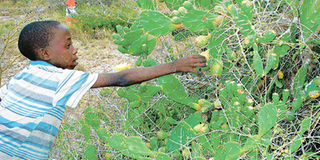Breaking News: At least 10 feared to have drowned in Makueni river
Four children starve to death

A boy plucks cactus fruits. A 13-year-old boy died after eating poisonous wild fruits in Muruana village in Mwingi South constituency last weekend. Photo/GEORGE KIKAMI
Four children are said to have died of hunger in Wajir and Mwingi districts in the past week. Kenya Red Cross statistics indicate that three cases of starvation were reported in Wajir six days ago.
In addition, a 13-year-old boy died after eating poisonous wild fruits in Muruana village in Mwingi South constituency.
Stomach pains
The boy’s father, Mr Stephen Kiule, told journalists that his son had gone to a nearby thicket to look for fruits, but he returned home complaining of stomach pains. Moments later he was dead.
The father of six blames the prolonged drought for his eldest son’s death. He acknowledged having received Sh10,000 from Vice- President Kalonzo Musyoka and a sack of maize from the provincial administration.
The Kenya Red Cross regional manager for North Eastern, Mr Ibrahim Hussein, pledged to supply enough relief food and carry out routine checks to ensure that no more lives were lost as a result of hunger.
In Kibwezi District, a family is grappling with the burden of caring for five children — including a disabled one — abandoned by their parents, who have fled the famine ravaging the area.
Mr Henry Munyao and his wife Esther are fending for the children whose parents could no longer afford to feed them due to crop failure and drought. Despite the difficult times, the couple has accepted to care for the children alongside theirs.
Taking care
“We are taking care of five children because their parents could no longer afford them food. We have no guarantee for food but we try as much as possible to provide for them,” Mrs Munyao said on Tuesday at their Muuni village home.
Already, a maize crop the family planted in late November last year and which they hoped would be ready in March has withered up, and with it hopes for an end to the hunger pangs they are experiencing.
Today, the children, due to the ongoing teachers’ strike, scavenge for edible wild fruits, further endangering their lives. “It’s not good (eating wild fruits) but we have no option. The situation is really bad,” said Mr Munyao.
Water wells have also dried up and residents now have to walk 20 kilometres to Kyumbi river in Makindu to access the commodity.
The Kenya Red Cross says the humanitarian crisis in Ukambani continues to get worse, adding that it has not received any relief food from the government or donor agencies.
Reports from Makindu district hospital indicate that 93 children have been diagnosed with kwashiorkor whereas another 331 others have been deemed underweight.




